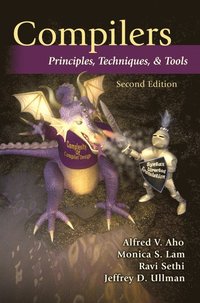
- Format
- Inbunden (Hardback)
- Språk
- Engelska
- Antal sidor
- 1040
- Utgivningsdatum
- 2006-10-01
- Upplaga
- 2
- Förlag
- Pearson
- Medarbetare
- Aho, Alfred / Ullman, Jeffrey / Sethi, Ravi / Lam, Monica
- Illustrationer
- Illustrations
- Dimensioner
- 243 x 168 x 42 mm
- Vikt
- Antal komponenter
- 1
- Komponenter
- DISK
- ISBN
- 9780321486813
- 1360 g
Compilers
Principles, Techniques, and Tools
- Skickas från oss inom 3-6 vardagar.
- Fri frakt över 249 kr för privatkunder i Sverige.
Passar bra ihop
De som köpt den här boken har ofta också köpt How to Win At Chess av Levy Rozman, Gothamchess (inbunden).
Köp båda 2 för 3695 krKundrecensioner
Fler böcker av Alfred V Aho
-
The AWK Programming Language
Alfred V Aho
-
Data Structures and Algorithms
Alfred V Aho
-
Design and Analysis of Computer Algorithms, The
Alfred V Aho
-
Computer Science
Edward K Blum, Alfred V Aho
Övrig information
Alfred V. Aho is Lawrence Gussman Professor of Computer Science at Columbia University. Professor Aho has won several awards including the Great Teacher Award for 2003 from the Society of Columbia Graduates and the IEEE John von Neumann Medal. He is a member of the National Academy of Engineering and a fellow of the ACM and IEEE. Monica S. Lam is a Professor of Computer Science at Stanford University, was the Chief Scientist at Tensilica and the founding CEO of moka5. She led the SUIF project which produced one of the most popular research compilers, and pioneered numerous compiler techniques used in industry. Ravi Sethi launched the research organization in Avaya and is president of Avaya Labs. Previously, he was a senior vice president at Bell Labs in Murray Hill and chief technical officer for communications software at Lucent Technologies. He has held teaching positions at the Pennsylvania State University and the University of Arizona, and has taught at Princeton University and Rutgers. He is a fellow of the ACM. Jeffrey Ullman is CEO of Gradiance and a Stanford W. Ascherman Professor of Computer Science at Stanford University. His research interests include database theory, database integration, data mining, and education using the information infrastructure. He is a member of the National Academy of Engineering, a fellow of the ACM, and winner of the Karlstrom Award and Knuth Prize.
Innehållsförteckning
1 Introduction
1.1 Language Processors
1.2 The Structure of a Compiler
1.3 The Evolution of Programming Languages
1.4 The Science of Building a Compiler
1.5 Applications of Compiler Technology
1.6 Programming Language Basics
1.7 Summary of Chapter 1
1.8 References for Chapter 1
2 A Simple Syntax-Directed Translator
2.1 Introduction
2.2 Syntax Definition
2.3 Syntax-Directed Translation
2.4 Parsing
2.5 A Translator for Simple Expressions
2.6 Lexical Analysis
2.7 Symbol Tables
2.8 Intermediate Code Generation
2.9 Summary of Chapter 2
3 Lexical Analysis
3.1 The Role of the Lexical Analyzer
3.2 Input Buffering
3.3 Specification of Tokens
3.4 Recognition of Tokens
3.5 The Lexical-Analyzer Generator Lex
3.6 Finite Automata
3.7 From Regular Expressions to Automata
3.8 Design of a Lexical-Analyzer Generator
3.9 Optimization of DFA-Based Pattern Matchers
3.10 Summary of Chapter 3
3.11 References for Chapter 3
4 Syntax Analysis
4.1 Introduction
4.2 Context-Free Grammars
4.3 Writing a Grammar
4.4 Top-Down Parsing
4.5 Bottom-Up Parsing
4.6 Introduction to LR Parsing: Simple LR
4.7 More Powerful LR Parsers
4.8 Using Ambiguous Grammars
4.9 Parser Generators
4.10 Summary of Chapter 4
4.11 References for Chapter 4
5 Syntax-Directed Translation
5.1 Syntax-Directed Definitions
5.2 Evaluation Orders for SDD's
5.3 Applications of Syntax-Directed Translation
5.4 Syntax-Directed Translation Schemes
5.5 Implementing L-Attributed SDD's
5.6 Summary of Chapter 5
5.7 References for Chapter 5
6 Intermediate-Code Generation
6.1 Variants of Syntax Trees
6.2 Three-Address Code
6.3 Types and Declarations
6.4 Translation of Expressions
6.5 Type Checking
6.6 Control Flow
6.7 Backpatching
6.8 Switch-Statements
6.9 Intermediate Code for Procedures
6.10 Summary of Chapter 6
6.11 References for Chapter 6
7 Run-Time Environments
7.1 Storage Organization
7.2 Stack Allocation of Space
7.3 Access to Nonlocal Data on the Stack
7.4 Heap Management
7.5 Introduction to Garbage Collection
7.6 Introduction to Trace-Based Collection
7.7 Short-Pause Garbage Collection
7.8 Advanced Topics in Garbage Collection
7.9 Summary of Chapter 7
7.10 References for Chapter 7
8 Code Generation
8.1 Issues in the Design of a Code G...
Du kanske gillar
-
Hello World
Hannah Fry
HäftadElon Musk
Walter Isaacson
InbundenFrågor & svar


